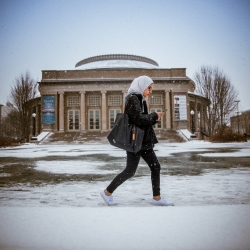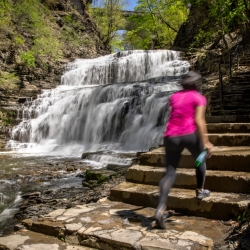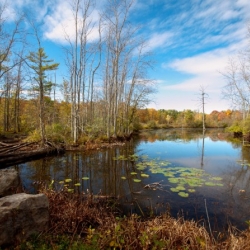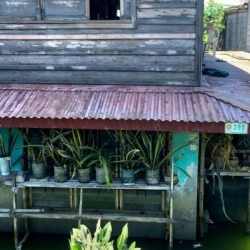Campus Sustainability News
News on campus sustainability initiatives, emerging programs, rankings, awards, student initiatives, green teams, and more from across the Cornell University campus.

What was the impact on campus energy use from reduced on-campus student presence and workforce, and changed operations, during the 2020 COVID pandemic? Diving into data from the campus energy dashboard, a decline in energy consumption was offset by increased air handled and ventilation in campus buildings.

Now through Earth Day purchase a reusable takeout container and utensil set for just $5 at one of eight Cornell Dining locations.

The Association for the Advancement of Sustainability in Higher Education (AASHE) has released its 2020 Sustainable Campus Index. See how Cornell compares as one of the top-ranked institutions in the nation for comprehensive sustainability efforts.

Carolyn Finney, author of “Black Faces White Spaces: Reimagining the Relationship of African Americans to the Great Outdoors,” and scholar-in-residence at the Franklin Environmental Center at Middlebury College, will give a lecture about her nationally recognized work to increase awareness of how privilege shapes who gets to inform and determine policy and action on environmental issues. It is offered in partnership with Ithaca Children’s Garden, The Learning Farm, U.S. Fish and Wildlife, and the Finger Lakes Land Trust, and takes place virtually on Thursday, February 25, 2021, at 6 p.m. It is free and open to the public on Zoom; pre-registration required.

Sludge, slag and other waste produced by the steel industry are not only hazardous to the environment, but can be expensive for companies to discard. A new research project led by Cornell will seek an integrated approach to turning that waste into valuable materials using a $1.5 million grant from the U.S. Department of Energy.

A live virtual event focused on preventing future pandemics, recognizing that human health is inextricably linked to the health of wildlife, livestock and the environment, will be moderated by New York Times journalist Thomas L. Friedman with a keynote address from noted naturalist Jane Goodall. The webinar, titled “Emerging Disease, Wildlife Trade and Consumption, and the Need for Robust Global Governance: Exploring Ways to Prevent Pandemics,” will take place Feb. 23 from 9 a.m. to noon and is co-hosted by the College of Veterinary Medicine, the World Wildlife Fund and the Cornell Atkinson Center for Sustainability.

The 2021 Climate Change Series provides a range of perspectives on the science of climate change and its implications for agriculture, ecosystems, and food systems and offers significant economic, ethical, and policy insights. “This seminar series brings in the brightest minds from across the world in different disciplines to understand the difficulty and complexity of climate change and the innovations already in progress to solve this problem," says Professor Peter Hess, who leads the seminars.

Cornell is teaming up with climate justice leaders to build sustainability efforts across the University community, reviving its commitment to the environment in light of the pandemic and worldwide movements for racial and social equality. In collaboration with the New York Coalition for Sustainability in Higher Education and Ithaca College, Cornell hosted the 2020 State of New York Sustainability Conference in December, featuring well-known figures in the science community, including Bill Nye ’77, Sen. Rachel May (D-N.Y.) and marine biologist and conservation expert Dr. Ayana Elizabeth Johnson.

The Amazon River Basin is under threat, largely at the hands of humans. To help change that, Prof. Carla Gomes, computer science, Prof. Alexander Flecker, ecology and evolutionary biology, and Rafael Almeida, postdoctoral researcher with the Atkinson Center for a Sustainable Future, designed an interdisciplinary research project to inform policymakers of the environmental consequences of human actions.

Despite severe, frequent flooding in coastal regions in the Philippines due to climate change, most residents do not consider migration as a short-term solution, according to new Cornell research. Lindy Williams, professor of global development and a member of the Migrations Lab, profiled two cities, one in Luzon and one in Bulacan, as they face the risks and consequences of frequent flooding.
